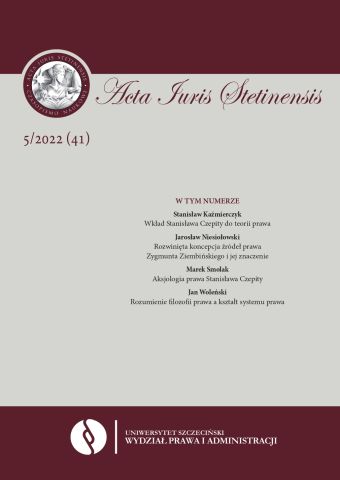







| Authors: |
Jan
Woleński

Wyższa Szkoła Informatyki i Zarządzania w Rzeszowie |
| Keywords: | jurisprudence legal theory doctrinal studies of law natural law legal positivism |
| Data publikacji całości: | 2022 |
| Page range: | 15 (135-149) |
| Downloads ?: | 65 |
| 1. | Coleman J., Himma K., Shapiro S. (red.), The Oxford Handbook of Jurisprduence and Philosophy of Law, Oxford 2004. |
| 2. | Czepita S., Koncepcje teoretycznoprawne Czesława Znamierowskiego, Poznań 1988. |
| 3. | Hołówka J., Dziobkowski B. (red.), Filozofia prawa. Normy i fakty, Warszawa 2020. |
| 4. | Hart H.L.A., Concept of Law, Oxford 1961. |
| 5. | Hart H.L.A., Pojęcie prawa, Warszawa 1998. |
| 6. | Jakubiec H., Ontologia a wielopłaszczyznowa teoria prawa, „Zeszyty Naukowe UJ – Prace z Nauk Politycznych” 1979, nr 12. |
| 7. | Lande J., Historia filozofii prawa, w: J. Lande, Studia z filozofii prawa, Warszawa 1959. |
| 8. | Lang W., Obowiązywanie prawa, Warszawa 1962. |
| 9. | Miller, Jr. F.D., C.-A. Biondi C.-A. (red.), A History of the Philosophy of Law from the Ancient Greeks to the Scholastic, Dordrecht 2007. |
| 10. | Opałek K., Problemy metodologiczne nauki prawa, Warszawa 1962. |
| 11. | Opałek K., Zagadnienia teorii prawa i teorii polityki, Warszawa 1986. |
| 12. | Opałek K., Wróblewski J., Zagadnienia teorii prawa, Warszawa 1969. |
| 13. | Padovani A., Stein P. (red,), The Jurists’ Philosophy of Law from Rome to the Seventeenth Century, Dordrecht 2007. |
| 14. | Peczenik A., Wartość naukowa dogmatyki prawa. Praca z zakresu porównawczej metodologii nauki prawa, Kraków 1966. |
| 15. | Peczenik A., Scientia Juris. Legal Doctrine as Knowledge of Law and a Source of Law, Dordrecht 2005. |
| 16. | Riley P., The Philosophers’ Philosophy of Law from the Seventeenth Century of Our Days, Dordrecht 2009. |
| 17. | Stelmach J., Sarkowicz R., Filozofia prawa XIX i XX w., Kraków 1999. |
| 18. | Woleński J., Z zagadnień analitycznej filozofii prawa, Kraków–Warszawa 1980. |
| 19. | Wronkowska S., Ziembiński Z., Zarys teorii prawa, Poznań 2001. |
| 20. | Wróblewski J., Postawa filozoficzna i filozoficzna współczesnej teorii prawa, w: J. Wróblewski, Pisma wybrane, Warszawa 2015. |
| 21. | Ziembiński Z., Problemy podstawowe prawoznawstwa, Warszawa 1980. |
| 22. | Zirk-Sadowski M., Wprowadzenie do filozofii prawa, Warszawa 2011. |